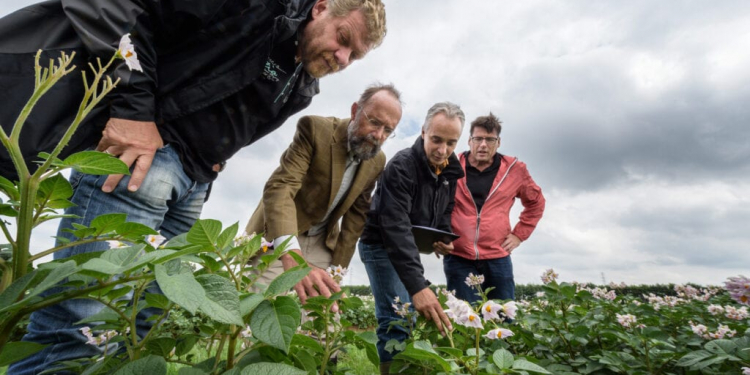Cisgenic potatoes do not provide a different soil life than classically bred potatoes.
This is evident from a study by German, Irish and Wageningen researchers.
The researchers planted two potato varieties on test fields in Ireland and the Netherlands. Central to the research was resistance to the potato disease Phytophthora. A potato variety had a cisgenic variant, in which a resistance gene from a wild potato plant was added by means of genetic modification, and a classically bred variant without this resistance gene. The second potato variety had obtained resistance genes by crossing and selection.
Soil bacteria
The renowned German Thünen Institute of Biodiversity assessed soil life. Biologists are increasingly aware of the interaction between plants and soil bacteria and fungi, and see that biological communities are forming around the roots of plants. The German institute compared the DNA of the bacteria and fungi around the roots of cisgenic potatoes with that around the classically bred potatoes. They found no demonstrable differences.
Variation
Incidentally, the researchers did find a lot of variation in the bacterial and fungal communities, but that variation was due to environmental factors such as the soil type and weather conditions and not because of the breeding technique. The researchers published the results this month in Frontiers in Bio-engineering and Biotechnology .

Entry Requirements
Agronomist Bert Lotz, who was involved in the research from WUR, states that this study confirms earlier research that genetic modification with genes inherent in the species does not have any environmental effects. The study comes at a good time, says Lotz, because the EU is currently investigating whether new breeding techniques such as cisgenesis should still fall under the strict 2001 GMO admission requirements. ‘Research in recent years has shown that you should not base the risk analysis on the technique used, but on the property in the plant that you are adapting.’
Interesting detail: GMO activists have probably tried to block this investigation. The results of the study are based on two years of field trials in Ireland and one year in the Netherlands. ‘In that other year, our test field in the Netherlands was destroyed,’ says Lotz. “We don’t know by whom, the destruction was never claimed.”







